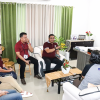In a move to strengthen support for farmers and advance the rubber industry, Regional Executive Director of the Department of Trade and Industry (DTI), Engr. Al-Zamir I. Lipae, paid a courtesy visit to the Philippine Rubber Research Institute (PRRI) Executive Director Cheryl L. Eusala. During the meeting, Director Lipae proposed an urgent meeting between the two agencies to explore collaboration opportunities and align their assistance programs to benefit farmers and enhance the rubber value chain.
Director Lipae emphasized the need to avoid duplication and streamline efforts between PRRI and DTI. By coordinating their initiatives, the agencies can optimize resources and provide comprehensive support to farmers. The proposed meeting aims to align the assistance programs and synchronize them with the various stages of the rubber value chain.
Responding to Director Lipae’s proposal, Director Eusala acknowledged the challenge of completing the rubber value chain. She highlighted that postharvest processing is an integral part of PRRI’s five-year strategic plan. Director Eusala expressed interest in exploring how PRRI and DTI could collaborate in this area, leveraging each agency’s expertise to develop effective postharvest processing programs. DTI Provincial Director Marlon A. Alabata echoed the sentiment, emphasizing the numerous uses of rubber across various industries. The versatility of rubber opens up a wide range of economic opportunities that can benefit both farmers and the overall economy.
Director Eusala addressed a common misconception about PRRI being solely a research institute. She shared that research is just one of the seven specific functions of PRRI. The institute also provides production support, extension services, and marketing support, among others. Director Eusala urged the public to recognize the value of rubber and its potential to address poverty-related issues. She explained that natural rubber’s value increases over time, making it a reliable and potentially lucrative source of income. With an economic lifespan of at least 30 years, rubber can serve as a retirement crop, ensuring long-term financial stability for farmers.
Furthermore, Director Eusala highlighted the importance of improved technology and mechanization in the rubber industry. These advancements help mitigate soilborne diseases, such as white root rot disease, and optimize the production process, leading to higher yields and increased profitability for farmers.
The meeting between DTI and PRRI signifies a significant step toward collaboration and synergy between government agencies in supporting the rubber industry. By joining forces, DTI and PRRI aim to enhance the value chain, improve postharvest processing techniques, and maximize the economic potential of rubber farming. This partnership will ultimately benefit farmers, create sustainable livelihoods, and contribute to the overall development of the rubber industry in the Philippines.
-???????????????????????? ????. ????????????????????




